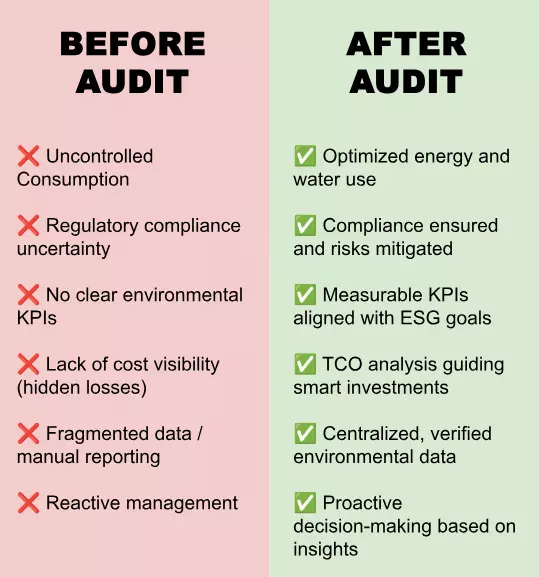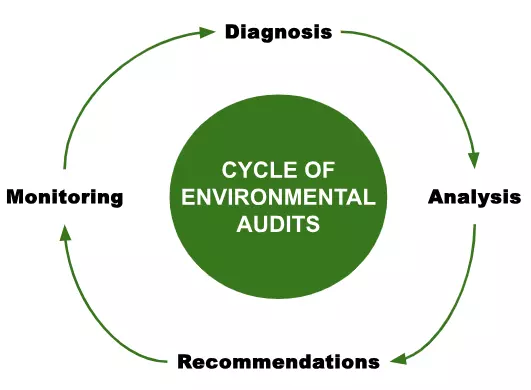79% of national greenhouse gas emissions in South Korea are covered by the Korean Emissions Trading Scheme (K-ETS), making it one of the most comprehensive carbon markets in Asia. Meanwhile, over 93% of large corporations plan to strengthen their ESG management practices in the coming year, driven by tightening regulations and investor expectations.
Yet, many industrial companies still face the same critical question:
Where do we start?
Environmental audits are emerging as the essential first step for businesses looking to understand their environmental performance, ensure compliance, and identify opportunities to improve operational efficiency. As South Korea intensifies its push toward carbon neutrality by 2050, regular environmental audits in Korean industry are becoming not just a compliance tool but a strategic lever for resilience and competitiveness.
In this article, we explore how environmental audits can help Korean industries navigate new regulatory pressures, improve operational performance, and lay the foundation for a robust ESG strategy.
Why Environmental Audits Matter for Industrial Performance and ESG
In today’s rapidly evolving regulatory and climate landscape, environmental audits offer companies a clear, data-driven understanding of their operational impact. Unlike standard compliance checks, a thorough audit assesses a facility’s use of energy, water, raw materials, emissions, and waste generation. It identifies inefficiencies, potential violations, and opportunities for improvement that might otherwise go unnoticed.
For South Korean companies operating in emissions-intensive sectors like chemicals, electronics, or manufacturing, audits are a crucial step in aligning with the Korean government’s 2030 and 2050 climate targets. Regular audits not only help ensure compliance with existing regulations such as the K-ETS and environmental disclosure rules, but they also prepare businesses for upcoming ESG reporting requirements and international supply chain expectations.
Moreover, audits offer a cost-effective way to uncover operational inefficiencies. For example, identifying and correcting excess water or energy usage can lead to immediate savings while reducing environmental footprint. As industries seek both competitiveness and climate resilience, audits provide a foundation for informed decision-making, smart investments, and long-term value creation.

Understanding ESG Disclosure and Environmental Regulations
South Korea's environmental regulations are evolving quickly. Under the K-ETS, companies emitting more than 25,000 tons of CO₂ per year are required to track, report, and reduce their emissions. This covers approximately 816 of the largest sites in Korea and more than 79% of national emissions.
Additionally, mandatory ESG disclosures are being introduced progressively. From 2025, large listed companies on the KOSPI with over KRW 2 trillion in assets will be required to publish ESG reports. By 2030, this will extend to all listed firms. Companies that are designated as "Green Companies" by the Ministry of Environment already have to publish verified annual environmental reports.
Understanding how to prepare for ESG reporting in South Korea is becoming essential for companies facing both national and international scrutiny. These regulatory shifts highlight the urgency of ESG compliance for manufacturing companies and heavy industries alike.
Audits play a key role in preparing companies for this shift by helping them collect, verify, and analyze the data needed for disclosure and to avoid greenwashing risks.
What an Environmental Audit Reveals and Why It Matters
An environmental audit provides a comprehensive review of a site’s environmental performance. It typically covers:
- Energy and water consumption
- Waste generation and recycling
- Air and water emissions
- Equipment efficiency
- Compliance with legal thresholds
More importantly, it delivers actionable insights: where are the losses, which systems can be optimized, and what upgrades would deliver the best return on investment (ROI)? For example, one audit may reveal that a facility's compressed air system is leaking energy, costing millions annually. Another might uncover opportunities to recycle sludge or wastewater more efficiently.
Among the benefits of regular environmental audits are reduced utility costs, increased asset lifespan, and better risk control.
Audits also inform investment decisions by providing Total Cost of Ownership (TCO) data, paving the way for cost-efficient retrofits and operational upgrades.

Why Environmental Audits Should Be Ongoing, Not One-Off
A one-time audit is just a snapshot. To achieve lasting improvement, audits must be part of an ongoing cycle. Operational conditions evolve, regulations change, and ESG expectations increase. Regular audits allow companies to:
- Monitor progress against KPIs
- Adjust sustainability targets
- Justify new investments with updated data
- Improve internal accountability and stakeholder confidence
Regular environmental audits are also key to supporting long-term ESG goals, enabling continuous improvement and preparing for both expected and unforeseen disruptions.

Environmental Audits: A Strategic Advantage for Industry
From global investors to local regulators, the pressure to act on sustainability is mounting. But for Korean industries, this pressure is also an opportunity. By investing in regular environmental audits, companies gain not only compliance and cost-saving advantages, but also a competitive edge.
Industries like chemicals, electronics, and food processing are already showing that with data, diagnostics, and a clear roadmap, transformation is possible. Environmental audits are not just about checking boxes, they are about building smarter, cleaner, and more resilient industrial operations in a country that is rapidly redefining its environmental legacy.
Learn more about Veolia's solutions:
Want to take the first step?
Contact our Experts Today!

